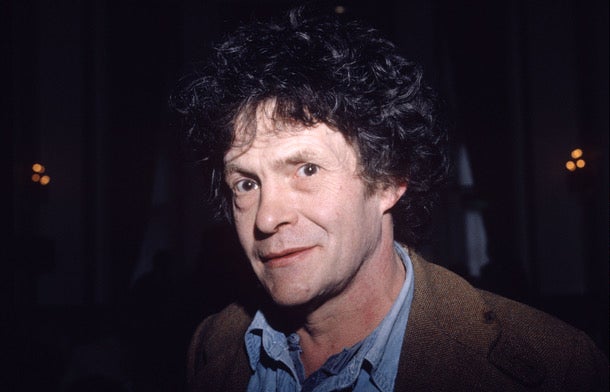Heathcote Williams: Anti-establishment polymath who foresaw our celebrity culture
The playwright, pamphleteer and activist found commercial success with his odes to endangered species

Heathcote Williams, who has died of emphysema aged 75, was a playwright, poet, anarchist and magician who – in addition to founding a secessionist state with a group of London squatters – wrote one of the most acclaimed plays of the 1970s, along with best-selling poems about dolphins and whales.
Williams, a reedy Oxford University dropout who for many years sported black combat boots and a mass of curly red hair, emerged from Britain’s Sixties counterculture movement as a sort of artistic Prospero, a gifted but mischievous writer whose creative talents recalled those of Shakespeare’s sorcerer in The Tempest.
He wrote a dozen plays, many of them critical of society’s increasing obsession with celebrity; published several scholarly, book-length poems on endangered animals; and co-founded an anarchist publishing house, Open Head Press, that skewered the Royal Family in pornographic postcards and scurrilous pamphlets.
Williams also appeared in more than a dozen film and television roles, including as Prospero in Derek Jarman’s 1979 adaptation of The Tempest, and helped start the “sex paper” Suck, an underground Amsterdam publication at the fore of Europe’s sexual liberation movement. He performed as a fire-breather (at one point accidentally setting himself on fire), practised conjuring tricks, contributed to a television show about Charles Dickens’s love of magic, and struck up a relationship with Jean Shrimpton, the 1960s supermodel who helped popularise the miniskirt.
Despite being championed by figures ranging from the playwright and Nobel laureate Harold Pinter to Hollywood actor Al Pacino, Williams’s work often received little public attention – in large part because of its difficult subject matter and experimental style. For example, his groundbreaking play AC/DC, which premiered at London’s Royal Court Theatre in 1970 and opened in New York the following year, concluded with a trepanation – the piercing of a character’s skull.
The play, New York Times critic Charles Marowitz wrote in a review, placed Williams alongside Pinter, John Osborne and John Arden as one of the leading playwrights of the era. “It is,” he wrote, “the only play yet written to capture the tremulously combustible nature of the 21st century, which, because our mortal lives always trail chronology, is the century in which we are actually living.” Performed amid closed-circuit television sets, with photographs of famous people plastered on the theatre walls, the show was perhaps the first major theatrical work to criticise the glorification of celebrities in the television age.
John Henley Heathcote Williams was born in Helsby, near Liverpool, on 15 November, 1941. His father was a lawyer, and his mother a homemaker. Although Williams at times intimated that he had a working-class background, he was schooled at Eton and studied law at Oxford before dropping out about the time he published his first book, The Speakers (1964).
Written in a journalistic style, the work was a sympathetic portrait of the impassioned (and often drunk) orators of Speakers’ Corner in Hyde Park. “These are the only people I’d ever want to listen to,” Pinter wrote, reviewing the book for the Observer; in a subsequent encounter at a barber’s shop, he encouraged Williams to try his hand at playwriting.
The result was The Local Stigmatic, a one-act that premiered in 1966 and – featuring a pair of lowlifes who follow celebrities in the news and greyhounds at the track – presaged some of the themes of AC/DC. The show was a favourite of Pacino’s; he starred in its unsuccessful US premiere and later produced and appeared in an hour-long film adaptation that was never given a theatrical release.
“When you read [it], you’re genuinely confused by it,” Pacino once told the writer Lawrence Grobel, acknowledging the play’s difficulty. “After two or three readings you start to see what he’s getting at, and it’s a revelation. It’s the difference between Heathcote Williams and other writers. Heathcote was writing about something that was deeply personal and much more far-reaching than the other plays of that period.”
By the late 1970s, Williams had turned from playwriting to overt political activism, joining with the graphic designer Richard Adams to design and distribute pamphlets, postcards and other documents in the tradition of Britain’s 18th- and 19th century “radical squibs.”
Their headquarters in Notting Hill – then a run-down neighbourhood – eventually served as a base of operations for a short-lived secessionist state that Williams and other leaders called the Free and Independent Republic of Frestonia, as well as an organisation called the Ruff Tuff Cream Puff Estate Agency, which helped squatters find abandoned buildings in London to use as temporary housing.
Survivors include his partner Diana Senior; their two daughters, China and Lily Williams; a son, Charlie Gilmour, from a relationship with the novelist Polly Samson; a sister, Prue Cooper; and three grandchildren. Williams’s commercial breakthrough was a departure from the skull-piercing of his early years. In such verse works as “Whale Nation” (1988), “Falling for a Dolphin” (1989) and “Sacred Elephant” (1989), he mixed poetry with scholarship to spotlight endangered species that he sometimes studied first-hand, including on a six-month trip to the western coast of Ireland.
Still, politics was not a subject he could avoid for long. Last year he published a pamphlet, “The Blond Beast of Brexit: A Study in Depravity,” that collected unsavoury quotes by Boris Johnson. “There’s a German word for people like Johnson: Backpfeifengesicht,” Williams told the Independent, explaining what drew him to the subject. “It means ‘a face that needs to be punched.’ ”
John Henley Heathcote Williams, poet and dramatist, born 15 November 1941. died 1 July 2017
© Washington Post
Subscribe to Independent Premium to bookmark this article
Want to bookmark your favourite articles and stories to read or reference later? Start your Independent Premium subscription today.

Join our commenting forum
Join thought-provoking conversations, follow other Independent readers and see their replies